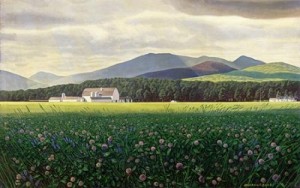In the original draft of Night Conference (previous post) I used the device of casting the poem in the second person. I was dealing with an inside-the-head moment–a situation where, as a writer, I frequently go off the rails. By using the second person voice, I was able to treat myself more as a character seen from outside. It is also a device that (at least rhetorically) narrows the audience to one. If successfully done, this can create a more intimate space for the reader to inhabit.
But my wife Terry, my frequent and insightful first reader, found it to be an obstacle. Where identification with the poem is incomplete, the second person voice is dissonant. The strategy that allowed me to get the poem roughed out the way I wanted it, no longer served. In my first revision, I cast the poem back into the first person.
Also, noting how the original draft often finds a walking rhythm, then loses it, I went for a shorter line with a more even meter, in order to create better momentum.
Night Conference, edit 1
The single room is quiet
but my head is buzzing,
so I take the elevator
down to the wide lobby,
out past the hotel bar,
too jet-lagged to suffer
chatter from a stranger.
Out past the doorman,
away from the avenue
brawling with traffic,
onto a narrow side street
where no one is walking,
where a windowsill cat
watches a pigeon sleeping
head tucked into its wing.
I leave behind cell phone,
car keys, as I left behind
home, village, work and kin,
the lights and the traffic,
seeking—who can say?
Wishing that the night
would swallow my thinking,
as it swallowed the light
over the western ocean,
the way it swallows up
the television muttering
as I pass below a window.
Block by block by block
I try to walk it off,
til sleep might beckon
like light from an open door.
Just me and my shadow,
that lengthens, shortens,
like the beat of a candle
as I leave one pool of light
and walk on to the next.
Just me and the brick echo
ticking back an afterthought
to every wakeful step.
While I was more happy with the revision than with the draft, I found that the first person didn’t ring quite right either. Damn pronouns! So I used another device that avoids pronouns altogether, the imperative. The “understood” pronoun is back to the second person–you. But the effect here is, I think different. It feels more insomniac, with a detached mental “I” making demands of a sleepless body–the understood “you.”
Night Conference, edit 2
The single room is quiet
but the head is buzzing,
so walk downstairs
into the bright lobby,
and out past the hotel bar,
too jet-lagged to suffer
the chatter of strangers.
Pass the dozing doorman;
get away from the avenue
brawling with traffic,
to the numbered streets
where no one is waking,
save a cat in a window
watching a pigeon sleeping,
head tucked under its wing.
Leave behind the phone,
the keys, as village, work,
and kin are all now behind;
leave the lights and traffic,
to seek out—who can say?
Hope, perhaps, that night
might quench this restlessness,
the way it swallowed the light
above the western ocean,
as it now swallows the babble
of television unwatched
by unseen sleepers within.
Block by block by block,
walk–try to walk it off,
hoping sleep might beckon
like light from an open door.
Just a body and its shadow,
(that lengthens and shortens
like the beating of a candle)
passing under light after light.
Just shoes and the brick echo
ticking back its afterthought
to every wakeful step.
I’m not sure whether I am done with this not or not. Let me know what you think of the various versions in a comment below. If you would like to contribute a poem in progressive iterations, with comments on your own revision process, send it to dale@ncpr.org, and I will post it as a guest entry.






